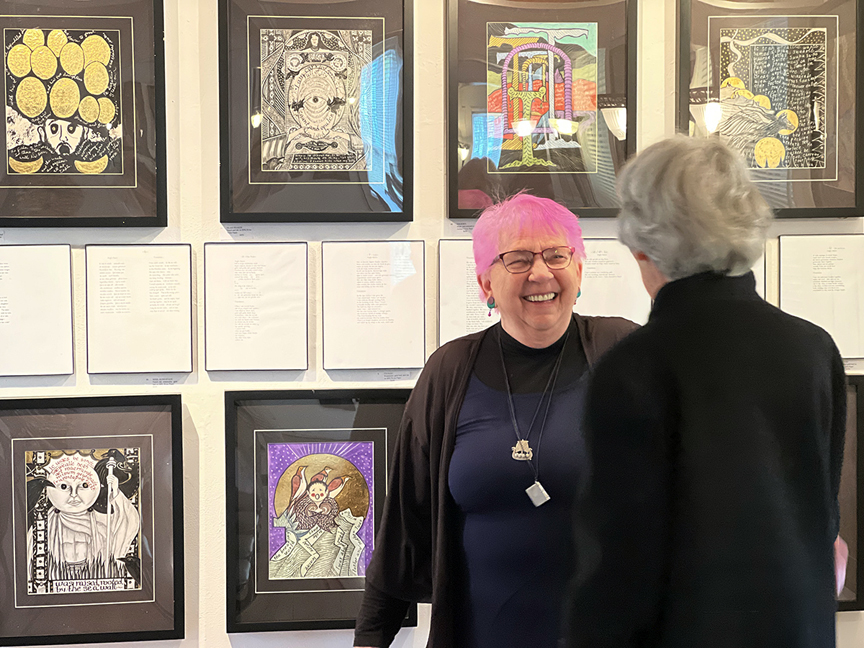
Poet and visual artist Bertha Rogers speaks with an attendee at the opening for an exhibit of illuminations created for her 2019 publication, “Uncommon Creatures: The Anglo-Saxon Riddle-Poems From the Exeter Book.” The event took place at Bright Hill Literary Center’s Word and Image Gallery on May 6. (Photo by Mark Stodl)
Illuminations Light Up
Word and Image Gallery in Treadwell
By TERESA WINCHESTER
TREADWELL
On May 6, Bright Hill Literary Center hosted its first art opening since the COVID-19 pandemic began in March 2020, with some 30 people in attendance. Appropriately, the featured artist was Bertha Rogers, who, with late husband Ernest Fishman, founded Bright Hill Press in 1992.
The exhibit, in the center’s Word and Image Gallery, features 68 stunning illuminations inspired by poetic riddles from “The Exeter Anthology of Old English Verse,” a 10th-century collection of Old English poetry donated to England’s Exeter Cathedral by Bishop Leofric in the 11th century, known as the “Exeter Book.”
Rogers has translated all of the 95 “Exeter Book” riddles into English from Anglo-Saxon, the earliest recorded form of the English language.
“Anglo-Saxon is a wonderful language. The sounds are so wonderful,” said Rogers, who wrote in the introduction to her anthology that Anglo-Saxon is rich with images, alliteration and two-word, hyphenated phrases known as kennings.
It is generally believed that medieval monks, who were literate, transcribed the riddles told by peasants, who were universally illiterate, said Rogers, who expressed an appreciation for those originally devising the riddles.
“I like the way people were examining the world and enjoying their riddles. These people were very funny,” she said, adding that riddles must be both accurate and mysterious to be effective.
“Some are funny, and some are serious,” she said.
Rogers’ translations of the riddles comprise her 2019 publication, “Uncommon Creatures: The Anglo-Saxon Riddle-Poems from the Exeter Book,” published by Six Swans Artist Editions. On the odd-numbered pages, it features each riddle-poem in Anglo-Saxon followed by its translation into modern English. On each even-numbered page is a print of the illumination illustrating the riddle.
As part of her presentation, Rogers read riddle-poem 8:
“I am a speaker of many voices, skilled sounds, plagiarized tunes. My head is full of noises, bell-loud. Wise guardian, I own the melody. Eminent evening shaper, I bring to men bliss in their towns, where they bow their heads, sit still in the court, summon shouts at my command. Say who I am, welcome me, declare me world mime. Clamor for my play!” The answer to the riddle is a jay, mockingbird or starling.
To create her illuminations, Rogers used a variety of mediums: pencil, ink, watercolor, acrylic, copper leaf and a great deal of gold leaf. The riddles are incorporated within the illuminations, sometimes in Anglo-Saxon, sometimes in English, and sometimes featuring a combination of both the medieval and modern languages. The answers to each riddle-poem appear at the end of the book.
Rogers translated the poems before creating the accompanying illumination. Animals, nature, water and ships are common subjects.
“The riddles are very direct. They tell you what to draw. The more I worked at it, the more interesting it got. I was obsessed,” she said, also noting that it took 20 years to complete her work on the riddle-poems.
“Her word-to-image graphic skills are through the roof. These works are just amazing,” said Mark Stodl, a professional artist and photographer.
“This is the work of a lifetime. You hardly know where to look. Everything is so stunning,” said poet Sharon Ruetenik, former international student advisor and part-time instructor at SUNY Delhi.
“I am pleased that we turned out to honor our accomplished prime mover, Bertha Rogers. Bright Hill would not have come to be without her. We all enjoyed the display of her massive painterly and poetic talents. Her work with Old English roots in the illuminations and translations were truly collaborations with those bygone artists,” said poet Robert Bensen, who has conducted the “Seeing Things” poetry workshop at Bright Hill Center since 2019.
“Uncommon Creatures” will be on view through June 3 by appointment only, made by contacting the center at info@brighthillpress.org or calling (607) 829-5055. Rogers’ book and her original illuminations will be for sale at the Word and Image Gallery. A portion of all proceeds will benefit Bright Hill Literary Center.
The center will host a Riddle-Poem Workshop by donation on May 20 from 2-4 pm. Pre-registration is requested by e-mailing info@brighthillpress.org to reserve a seat.
More information about Bright Hill Press & Literary Center of the Catskills is at www.brighthillpress.org. Programs are made possible by the New York State Council on the Arts with the support of Governor Kathy Hochul and the New York State Legislature.

